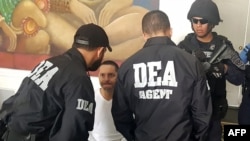A federal judge Wednesday threatened to throw out the guilty plea of a veteran U.S. narcotics agent who conspired with a Colombian cartel money launderer — an unexpected twist that could derail one of the most egregious misconduct cases in the history of the U.S. Drug Enforcement Administration.
U.S. District Judge Charlene Edwards Honeywell was expected to sentence the disgraced agent, Jose I. Irizarry, but refused to do so over what she called a "totally unacceptable" legal dispute.
"I have never seen anything like this," Honeywell said, postponing the sentencing indefinitely. "I'm not even sure at this point I'm going to accept this plea."
The heated hearing in Tampa federal court came nine months after Irizarry admitted parlaying his expertise in money laundering into a life of luxury that prosecutors said was bankrolled by millions of dollars he diverted from DEA control. The spoils included a $30,000 Tiffany diamond ring for his wife, luxury sports cars and a $767,000 home in the Caribbean resort city of Cartagena — on top of residences in south Florida and Puerto Rico.
At issue is a disagreement over whether the money Irizarry raided from undercover DEA accounts amounted to a misuse of government funds, as Irizarry contends, or the laundering of drug proceeds — a more serious offense that could add a decade to what was already expected to be a lengthy prison sentence.
Irizarry pleaded guilty last year to 19 counts, including conspiracy to commit money laundering and bank fraud, admitting he filed false reports and ordered DEA staff to wire money slated for undercover stings to international accounts he and associates controlled.
The case is the latest black eye for the DEA, which has seen repeated cases of agent misconduct in recent years. Just last week, longtime DEA agent Chad Scott was taken into federal custody after a jury in New Orleans convicted him of taking property from criminal suspects, adding to an earlier conviction on corruption charges.
But it's unclear what lessons the DEA has learned from Irizarry's scheme and whether other agents assigned to the Miami field office where his criminal activity began were involved. His guilty plea also leaves many unanswered questions about the level of supervision he received during his career, in which he had been entrusted with the government's use of front companies, shell bank accounts and couriers to combat international drug trafficking.
Irizarry's defense attorney contended in recent court filings that the accounts in question amounted to a profit-producing "slush fund" for official and personal travel of federal law enforcement, U.S. prosecutors and confidential sources.
"They were going to dinners, drinks and doing all sorts of things with this money," attorney Humberto Dominguez said in court Wednesday. "It was all documented."
The DEA did not respond to a request for comment on that claim.
But prosecutor Joseph Palazzo argued that Irizarry's actions could only have had one purpose regardless of whether the international wire transfers were channeled through DEA-controlled accounts.
"Once drug proceeds, always drug proceeds," he said. "The defendant was in a better position than anyone to know the source of these funds and where these funds were going."
The case could also have long-lasting implications on the DEA's undercover money-laundering operations. Irizarry was accused of sharing sensitive law enforcement information with co-conspirators, including a Colombian customs official and an alleged drug trafficker and money launderer.
The Colombian official, Omar Ambuilla, was arrested in April on a U.S. warrant accusing him of transferring to the U.S. proceeds from the conspiracy for the purchase of a 2017 Lamborghini Huracan Spyder in Florida.
The other alleged co-conspirator has not been identified in court filings except as a Colombian citizen who was the target of a DEA drug trafficking investigation before becoming the godfather to Irizarry's twin children in 2015.
U.S. law enforcement officials told The Associated Press last year that the unnamed conspirator is Diego Marin, describing him as Colombia's contraband king for his role helping launder drug dollars through the importation of containers full of electronics and other goods. Irizarry and his attorney referred to the alleged co-conspirator in court on Wednesday as a longtime U.S. government informant named "Diego."
Marin has not been charged. A U.S. attorney who has represented Marin in the past declined to comment.
Before he resigned in 2018, Irizarry's ostentatious habits and tales of raucous yacht parties had become legendary among DEA agents. Beginning around 2011, prosecutors said, Irizarry used the cover of his badge to file false reports and direct DEA personnel to wire funds reserved for undercover stings to accounts in Spain, the Netherlands and elsewhere — accounts that he controlled or were tied to his wife and his co-conspirators.
In all, Irizarry and his informants handled at least $9 million in drug proceeds that should've been carefully tracked by the DEA as part of undercover money laundering investigations, prosecutors said.
The indictment details at least $900,000 paid out from a single criminal account opened by Irizarry and an informant using the name, passport and Social Security number of a third person who was unaware their identity was being stolen.
